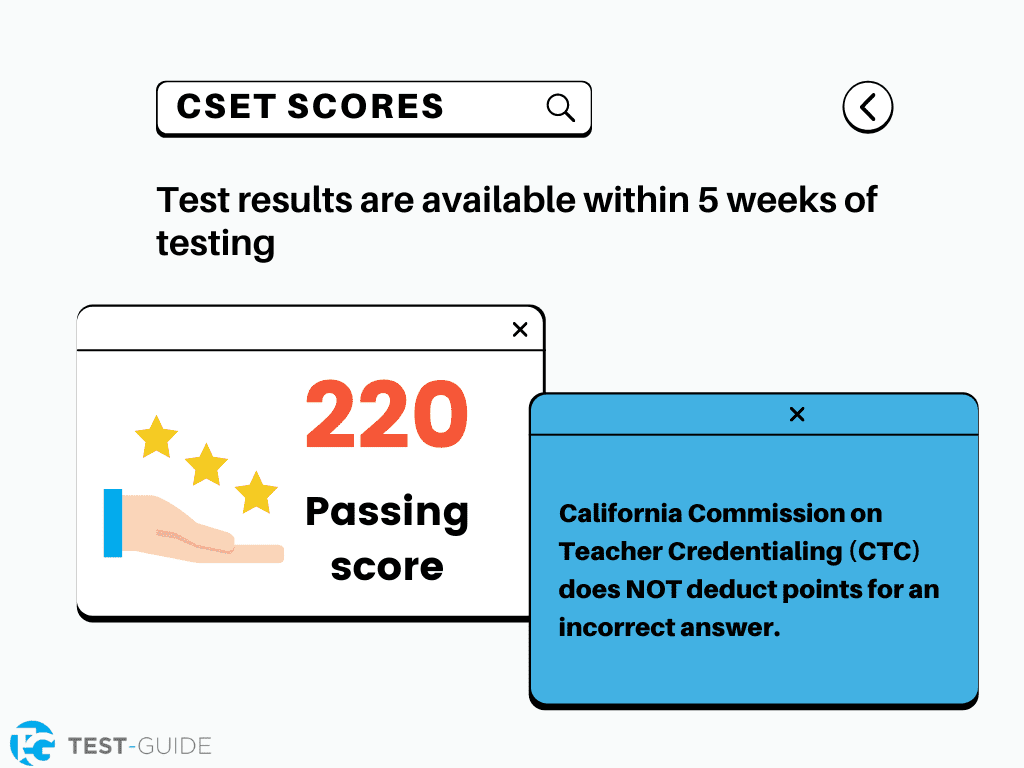The California Subject Examinations for Teachers, or CSET, is a group of subject matter tests used in California and other states to assess mastery of subject matter content for prospective K-12 teachers.
The credential you are applying for will determine what CSET exam(s) you’ll need to take. These are called subtests. They can be taken separate or together if you are taking multiple.
A passing score is a requirement for teacher certification in California. Try out a free CSET practice test below and see how you do.
Summary: Learn more about the California Subject Examination for Teachers and take a free CSET practice test below.
CSET Practice Tests and Resources
| Resource | Notes | Topics Covered |
| CSET Practice Test 1 | Subtest I: 52 multiple choice questions and extended responses. | Reading, Language, and Literature; Histroy and Social Science |
| CSET Practice Test 2 | Subtest II: 52 multiple choice questions and extended responses. | Science and Mathematics |
| CSET Practice Test 3 | Subtest III: 52 multiple choice questions and extended responses. | Physical Education; Human Development; Visual and Performing Arts |
| CSET Subtest I Terms | 95 terms regarding subtest I. | Reading, Language, and Literature |
| CSET Subtest II Terms | 82 terms regarding subtest II. | Science and Mathematics |
| CSET Subtest III Terms | 294 terms regarding subtest III. | Physical Education; Human Development; Visual and Performing Arts |
CSET Test Outline
There are three subtests as a part of the CSET test. Reference the table below for a breakdown of each subtest.
| Subtest | Domains | Multiple Choice Questions | Constructed Response Questions |
| I |
|
|
|
| Subtest Total | 52 | 4 | |
II |
|
|
|
| Subtest Total | 52 | 4 | |
| III |
|
|
|
| Subtest Total | 39 | 3 |
Additionally, there are many CSET single subject tests that you can take depending on what credential you are searching for. Reference the table below to see the details for each subtest and domain.
| Subtest | Number of Questions | Domain |
Agriculture (SUBTEST I, II, III) | 40 Multiple Choice 3 Constructed Responses | Plant and Soil Science, Ornamental Horticulture Animal Science, Environmental Science and Natural Resource Management, Agricultural Business and Economics, Agricultural Systems Technology |
Art (SUBTEST I, II) | 50 Multiple Choice 4 Constructed Responses | Aesthetic Valuing, Historical and Cultural Context of the Visual Arts, Artistic Perception, Creative Expression, Connections, Relationships, and Applications, History and Theories of Learning in Art |
Business (SUBTEST I, II, III) | 40 Multiple Choice 2 Constructed Responses | Business Management, Marketing, Accounting and Finance, Economics, Information Technology, Business Environment and Communication |
English (SUBTEST I, II, III, IV) | 50 Multiple Choice 2 or 4 Constructed Responses | Literature and Textual Analysis, Composition and Rhetoric, Language, Linguistics, and Literacy, Composition and Rhetoric, Literature and Textual Analysis, and Communications |
Health Science (SUBTEST I, II, III) | 40 Multiple Choice 1 or 2 Constructed Responses | Foundations of Health Education, Human Growth and Development, Chronic and Communicable Diseases, Nutrition and Fitness, Mental and Emotional Health, Alcohol, Tobacco, and Other Drugs |
Home Economics (SUBTEST I, II, III) | 40 Multiple Choice 1, 2, or 4 Constructed Responses | Personal, Family, and Child Development, Nutrition, Foods, and Hospitality, Fashion and Textiles, Housing and Interior Design, and Consumer Education |
Industrial and Tech Education (SUBTEST I, II) | 45 or 75 Multiple Choice 3 Constructed Responses | Nature of Technology, Power and Energy, Information and Communication, Project and Product Development |
Music (SUBTEST I, II, III) | 40 or 45 Multiple Choice 2 or 3 Constructed Responses | Artistic Perception, Historical and Cultural Foundations, Aesthetic Valuing, Creative Expression, Connections, Relationships, Applications, Music Methodology, and Repertoire |
Physical Education (SUBTEST I, II, III) | 40 Multiple Choice 1 or 2 Constructed Responses | Growth, Motor Development, and Motor Learning, The Science of Human Movement, The Sociology and Psychology of Human Movement, Movement Concepts and Forms, and Assessment and Evaluation Principles |
Science (SUBTEST I, II) | 50 or 100 Multiple Choice 4 or 3 Constructed Responses | Astronomy, Dynamic Processes of the Earth, Earth Resources, Waves, Forces and Motion, Electricity and Magnetism, Ecology, Genetics and Evolution, Molecular Biology and Biochemistry, Cell and Organismal Biology, Heat Transfer and Thermodynamics, Structure and Properties of Matter Subtest II is Biology, Chemistry, Earth Science, or Physics |
CSET Administration Information
Registration
In order to take the CSET test, you must register by appointment. The exam can be taken year-round (excluding some holidays), Monday through Saturday. Check appointment availability.
Registration is available online 24 hours a day, 7 days a week. Candidates may register for the CSET exam by mail, by phone, or online.
Certain registration options apply to specific deadlines, and when you choose to register can affect the costs and fees associated with taking the test. Register here.
The exam can be computer-based or taken on paper. It is up to the user to decide.
Session Lengths
Subtests I & II: 3 hours per subtest
Subtest III: 2 hours and 15 minutes
All 3 subsets in a single session: 5 hours
15 additional minutes are provided to complete a nondisclosure agreement and tutorial. Any time taken for breaks is considered part of your available testing time.
You are able to register to take any one subtest or all three subtests in a single session
Location
Fees
It is $99 per subtest taken separately or $247 for all subtests taken together.
After payment, registration will be valid for one year. If you do not take the test or withdraw your registration within that year, your registration will expire, and you will not receive a refund or credit.
That being said, if you would like to withdrawal your registration you can do so within the year and receive a refund.
If you have not scheduled your test appointment: Submit a withdrawal request through your account.
If you have already scheduled your test appointment:
1. Cancel your test appointment at least 24 hours before your scheduled testing time. Sign into your account, select “Reschedule”, and follow the instructions provided.
2. After cancelling your appointment, submit a withdrawal request through your account.
In most cases, if you follow proper protocol, you will receive your full refund of test fees, issued by Evaluation Systems within one week or your request.
CSET Requirements
You are only able to take the CSET Test if you have earned, at minimum, a high school diploma, a GED, or if you are or have been a student taking courses for college credit pursuant to a career in education.
If you are unsure about your eligibility, please contact the CTC for approval to test.
CSET Scores
A passing score is 220 per subtest.
It is important to note that when it comes to scoring the exam, the score is determined by both the multiple-choice section and the constructed responses section.
Not all the questions are weighted equally. As mentioned before, a minimum passing score is 220 with all subtests being scored from 100-300.
Additionally, the California Commission on Teacher Credentialing (CTC) does NOT deduct points for an incorrect answer. So, what does this mean? That you should answer every question on the test, even if it is a guess!
In terms of how the questions are arranged, they are not arranged in particular order when it comes to order of difficulty. So, it is important to pace yourself throughout the exam as the questions will be randomly placed with no regards to difficulty.
Test results are available within 5 weeks of testing. Review test results release dates.
If you fail the CSET, you must re-register for the entire test or subtest that you wish to take. You must wait 45 days from the date you took the test to retake a test or subtest on computer.
CSET FAQs
How long will I need in order to prepare for the CSET?
This will vary amongst individuals taking the exam, but it recommended that prepping one to two weeks before the exam is most beneficial.
Do CSET scores expire?
Passing CSET scores must be used for certification purposes within ten years from the individual passing date of each exam.
What can I bring to the CSET Test (Computer-Based Test)?
You must bring one piece of current, government-issues identification in English with your name and photo. You cannot bring any type of writing utensil to the testing center.
What can I bring to the CSET Test (Paper-Based Test)
You must bring one piece of current, government-issues identification in English with your name and photo.
As well as a printed copy of your admission ticket (electronic not accepted) and several sharpened No. 2 pencils.
How many times can you take the CSET?
You may retake the exam as many times as needed to pass, but testing rules require that you wait 45 days from the day you took the test before you can retest.


